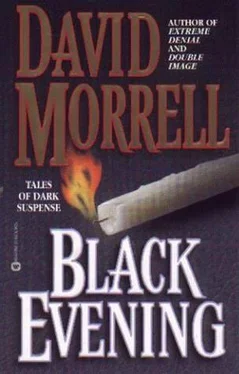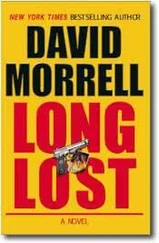David Morrell - Black Evening
Здесь есть возможность читать онлайн «David Morrell - Black Evening» весь текст электронной книги совершенно бесплатно (целиком полную версию без сокращений). В некоторых случаях можно слушать аудио, скачать через торрент в формате fb2 и присутствует краткое содержание. Жанр: Ужасы и Мистика, на английском языке. Описание произведения, (предисловие) а так же отзывы посетителей доступны на портале библиотеки ЛибКат.
- Название:Black Evening
- Автор:
- Жанр:
- Год:неизвестен
- ISBN:нет данных
- Рейтинг книги:4 / 5. Голосов: 1
-
Избранное:Добавить в избранное
- Отзывы:
-
Ваша оценка:
- 80
- 1
- 2
- 3
- 4
- 5
Black Evening: краткое содержание, описание и аннотация
Предлагаем к чтению аннотацию, описание, краткое содержание или предисловие (зависит от того, что написал сам автор книги «Black Evening»). Если вы не нашли необходимую информацию о книге — напишите в комментариях, мы постараемся отыскать её.
Black Evening — читать онлайн бесплатно полную книгу (весь текст) целиком
Ниже представлен текст книги, разбитый по страницам. Система сохранения места последней прочитанной страницы, позволяет с удобством читать онлайн бесплатно книгу «Black Evening», без необходимости каждый раз заново искать на чём Вы остановились. Поставьте закладку, и сможете в любой момент перейти на страницу, на которой закончили чтение.
Интервал:
Закладка:
"See, the trouble is," the old man said, "this typewriter ran out of words. It used up every word it had inside it."
Eric fought the urge to scream. This can't be happening, he told himself. "Then put more words inside it."
"Don't I wish I could. But once the words are gone, I can't put new ones in. I don't know why that happens, but I've tried repeatedly, and every time I've failed. I have to build a brand new model."
"Do it then. I'll pay you anything."
"I'm sorry, but I can't. I've lost the knack. I made five successful models. The sixth and seventh failed. The eighth was a complete disaster. I stopped trying."
"Try again."
"I can't. You don't know how it weakens me. The effort. Afterward, my brain feels empty. I need every word I've got."
"God dammit, try!"
The old man shook his head. "You have my sympathy."
Beyond the old man, past the counter, in the workshop, Eric saw another model. Knobs and levers, bolts.
"I'll pay a million dollars for that other one."
The old man slowly turned to look. "Oh, that one. No, I'm sorry. That's my own. I built it for my children. Now they're married. They have children of their own, and when they visit, my grandchildren like to play with it."
"I'll double what I offered."
Eric thought about his mansion on the Hudson, his estates in Bimini and Malibu, his yacht, his jet, his European trips, and his Ferrari.
"Hell, I'll triple what I offered."
Six more days, he thought. I've got to finish that new book by then. I'll just have time to do it. If I type every day and night.
"You've got to let me have it."
"I don't need the money. I'm an old man. What does money mean to me? I'm sorry."
Eric lost control. He scrambled past the counter, racing toward the workshop. He grabbed the other model. When the old man tried to take it from him, Eric pushed. The old man fell, clutching Eric's legs.
"It's mine!" the old man wailed. "I built it for my children! You can't have it!"
"Four! Four million dollars!" Eric shouted.
"Not for all the money in the world!"
The old man clung to Eric's legs.
"Dammit!" Eric said. He set the model on the counter, grabbed the old man's cane, and struck his head. "I need it! Don't you understand!"
He struck again and again and again.
The old man shuddered. Blood dripped from the cane.
The shop was silent.
Eric stared at what he'd done. Stumbling back, he dropped the cane and put his hands to his mouth.
And then he realized. "It's mine."
He wiped his fingerprints from everything he'd touched. He exchanged the models so his broken one sat on the workshop table. His chauffeur wouldn't know what had happened. It was likely he'd never learn. The murder of an old man in a tiny village on Long Island – there was little reason for publicity. True, Mrs. Davis might recall her evening visitor, but would she link this murder with her visitor? And anyway, she didn't know who Eric was.
He took his chance. He grabbed his prize, and despite its weight, he ran.
His IBM word processor sat on the desk in his study. For pure show. He never used it, but he needed it to fool his guests, to hide the way he actually composed. He vaguely heard the limousine drive from the mansion toward the city. He turned on the lights. Hurrying toward his desk, he shoved the IBM away and set down his salvation. Six more days. Yes, he could do the job. A lot of champagne and television. Stiff joints in his aching fingers after all the automatic typing. He could do it, though.
He poured a brimming glass, needing it. He turned the Late Show on. He lit a cigarette, and as The Body Snatcher's credits began, he desperately started typing.
He felt shaky, scared, and shocked by what had happened. But he had another model. He could keep his yacht, his jet, his three estates. The parties could continue. Now that Eric thought about it, he'd even saved the four million dollars he would have paid the old man for this model.
Curious, on impulse Eric glanced at what he'd typed so far.
And began to scream.
Because his random typing had become something different, as he'd expected. But not the gushy prose of Parson's Grove . Something far more different.
See Jack run. See Jill run. See Spot chase the ball.
("I built it for my children. Now they're married. They have children of their own, and when they visit, my grandchildren like to play with it.")
He screamed so loudly he couldn't hear the clatter as he typed.
See Spot run up the hill. See Jill run after Spot. See Jack run after Jill.
The neighbors half a mile away were wakened by his shrieks. They feared he was being murdered, so they called 911, and when the state police broke into the house, they found Eric typing, screaming.
They weren't sure which sight was worse – the man or the machine. But when they dragged him from the monstrous typewriter, one of the state policeman glanced down at the page.
See Jill climb the tree. See Jack climb the tree. See Spot bark at Jack.
Then farther down – they soon discovered what it meant – See Eric murder Mr. Donovan. See Eric club the old man with the cane. See Eric steal me. Now see Eric go to jail .
Perhaps it was a trick of light, or maybe it was the consequence of the machine's peculiar keyboard. For whatever reason, the state policeman later swore – he told only his wife – the damned typewriter seemed to grin.
Dennis Etchison is both a gifted fiction writer and a respected editor of short story anthologies. In 1991, for the third volume of his Masters of Darkness series, he asked me and a number of other contributors – Clive Barker, Stephen King, Dean Koontz, Joyce Carol Oates, and more – to choose a favorite from the stories we had written. He also requested that we compose an afterword, explaining our choice. The following is what I submitted.
A Trap for the Unwary
How does a writer choose a story, among many, that typifies what he or she has been trying to accomplish? Prior to selecting "But at My Back I Always Hear" (1983), I reread several others and finally settled on this one, not because it's my most horrific (although I did find my skin go cold but not to the frigid degree that was caused by "For These and All My Sins" or the middle section of my novel, Testament) and not because its style was experimental (as was "The Hidden Laughter"), but precisely because this story was so typical, an example of a technique and various themes I've returned to again and again.
Let's deal with the technique first. Like many novelists, I find the discipline, the compression , of a story enormously difficult. There's an irony here. In the early seventies, my initial effort at fiction was First Blood , but after I sent it to my agent, I had a nightmare that so compelled me I wrote it verbatim , a story called "The Dripping," which was purchased by Ellery Queen's Mystery Magazine and became my first sale, two weeks before my agent phoned to tell me a publisher had accepted First Blood . Other writers will understand. "The Dripping," to me, will always be special. A validation of my dreams.
But as I labored on my next book (the dreaded second novel syndrome: Can I possibly do it again?) , short story nightmares failed to visit me. And as that second novel, Testament , continued to give me problems, to aggravate my insecurity, I craved the satisfaction of writing another short, microcosmic, "I can do it with luck in a couple of days" validation of my ambition to be a hypnotist, a magician, a teller of tales.
I was then a professor of literature at the University of Iowa. By chance, preparing for a class, I picked up Robert Browning's "My Last Duchess" and felt a prickle of revelation. You see, "The Dripping" had been a first person narrative, but I've always been suspicious of first person narratives because of my admiration for Henry James. "The master," commenting on his consummate horror novel, The Turn of the Screw , had called his tale "a trap for the unwary" – because its first person technique made it impossible to decide if the narrator was telling the truth about the ghosts she encountered or if she was hopelessly insane. James in fact disdained the first-person technique, calling the device a trick in which the only interest for the reader was to decide if the "I" of the story was self-deluded, a liar, or crazy. So how could I, devoted to "the master," feel justified in following my instincts to repeat, to build on, what I'd done in "The Dripping" if the viewpoint I felt compelled to use had been dismissed by one of my literary heroes?
Читать дальшеИнтервал:
Закладка:
Похожие книги на «Black Evening»
Представляем Вашему вниманию похожие книги на «Black Evening» списком для выбора. Мы отобрали схожую по названию и смыслу литературу в надежде предоставить читателям больше вариантов отыскать новые, интересные, ещё непрочитанные произведения.
Обсуждение, отзывы о книге «Black Evening» и просто собственные мнения читателей. Оставьте ваши комментарии, напишите, что Вы думаете о произведении, его смысле или главных героях. Укажите что конкретно понравилось, а что нет, и почему Вы так считаете.












